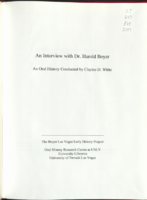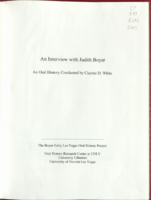Search the Special Collections and Archives Portal
Search Results

Transcript of interview with Paul Bowerman by Frances Harelik, March 5, 1976
Date
1976-03-05
Archival Collection
Description
Frances Harelik interviews IBM computer engineer Paul Bowerman in Las Vegas at Harelik’s home. Born in Wolforth, Texas in 1929, Mr. Bowerman relocated to Nevada in 1954. Other places Mr. Bowerman has lived include: California, Oklahoma, Arkansas, Illinois, New York, Minnesota, England, and Japan. From Mr. Bowerman’s perspective this interview provides insight into life in Las Vegas from 1954 to 1976.
Text

Transcript of interview with William Boyd by Theresa Bradley, February 26, 1981
Date
1981-02-26
Archival Collection
Description
Theresa Bradley interviews William W. Boyd, born in McNeil, Arkansas on January 27th, 1906, about his involvement in the gaming industry of Las Vegas. Boyd talks specifically about his experiences with five-card stud poker and his introduction of poker games without dealers to the poker room. Boyd also talks about his role as poker room manager at the Golden Nugget and how he was present to open the room when the casino first opened.
Text

Transcript of interview with Dr. Harold Boyer by Claytee D. White, November 15, 2000
Date
2000-11-15
Archival Collection
Description
Dr. Harold Boyer recalled with great clarity his childhood in Arkansas. Born in 1916 in Hartman, he attended a two-story school which went to eighth grade, fished in a nearby stream, and earned money from the age of six selling newspapers. He remembered that his father wore many hats, including that of town physician, president of the school board, and mayor. He also operated the movie theater and would drive around town announcing upcoming film features through a megaphone. Harold gave details of living through the Great Depression and completing his high school and college education. Dr. Boyer recited many details of his life in the Marine Corps as a medic, serving on active duty in the Pacific arena in WWII, going into medical practice in Oklahoma City and Enid, Oklahoma, and being called back to serve in Korea. In 1952, while checking out practices in several Southwest locations, he came to Las Vegas and interviewed with Dr. Carver Coffman. Harold painted a picture of Las Vegas in the sixties and described his practice and the many organizations in which he participated. He described how certain entities contributed significantly to the growth in the Vegas Valley, including the Convention Bureau, the Elks Club, Rotary Club, Shriners, the Mormon Church, the Mesquite Club, the university, and the gaming industry. He also gave a very positive view of the cultural activities that were/are available to the people of Las Vegas. Comments by Dr. Boyer on race relations recalled the sixties when integration in area schools, hotels, and neighborhoods became a reality under strong black leadership. He also talked about the relationship between casino operators and the civic organizations previously mentioned, and included an anecdote concerning one of his patients and A1 Capone. Helldorado, a unique community celebration, began in 1937 and was designed to draw positive attention to Las Vegas and pull people together. Dr. Boyer described the parades, dances, games, and barbecues that made it so much fun, and listed the founders who made it possible. This list includes people like the Von Tobels, Bob Squires, Bill Ferret, and the Ronzoni family. He related that Helldorado gradually faded out as corporations took over the gaming industry and the population grew to hundreds of thousands. Howard Hughes, the Greenbaums, and Bugsy Siegel are some of the people Dr. Boyer recalled as part of the fabulous tapestry that makes Las Vegas special. He talked about those who had a positive influence on the town, like Ed Von Tobel, Jess Abbott, and Jackie Gaughan. He has wonderful ideas for creating a park near the downtown area that would rival Central Park in New York, Golden Gate Park in San Francisco, or Audubon Park in New Orleans. His closing comments reflect on special projects conducted by the Rotary Club and the future of Las Vegas as an international air travel transportation hub.
Text

Transcript of interview with Judith Boyer by Claytee D. White, November 8, 2005
Date
2005-11-08
Archival Collection
Description
Before moving to Las Vegas, Judith Boyer graduated from the University of Southern California where she received a degree in business merchandising. She grew up in the Los Angeles area as an only child and discusses Southern California, married life and traveling. Judith moved to Las Vegas in November of 1948, worked at Ronzoni's Department Store on Fremont Street and then got the chance to work for Bonanza Airlines as a stewardess. Hostessing for an airline was her dream job and she did it for two years, but gave it up to marry Karsten Bronken and start their family. She discusses Las Vegas as it was in the 1950s. Her memories encompass great stories about the city when people still rode horses around town, participated in Heldorado Parades and enjoyed the early hotels and casinos that were so different from those of today. After her first husband passed away, Judith married Dr. Harold Boyer, who was a dermatologist in Las Vegas for many years. She shares several memories and anecdote
Text

Transcript of interview with John Boyle by Meghan Boyle, March 14, 1981
Date
1981-03-14
Archival Collection
Description
Meghan Boyle interviews her father John Boyle (born 1924 in Risen, Arkansas), who at the time was Chief Pilot of Operations for Republic Airlines. The two discuss changes in air travel over the years and John’s profession as a pilot. They also discuss improvements in Las Vegas roads over the years, the rise in crime rates, and the impacts on changes in the economy.
Text

Transcript of interview with Eugene Brandise by Mark Mangiaracina, March 3, 1980
Date
1980-03-03
Archival Collection
Description
Mark Mangiaracina interviews Eugene Brandise, born in Denver, Colorado, in his home about Nevada’s growth over time. Brandise discusses his experience as a construction worker and construction business owner as a resident of Las Vegas for over 25 years. He also discusses changes in the gaming industry over time, specifically how hotels and casinos treat their patrons.
Text

Transcript of interview with Charlotte Brascia by Joe Mascellino, February 24, 1977
Date
1977-02-24
Archival Collection
Description
Joe Mascellino interviews Charlotte Brascia in his home about the history of Nevada. Mascellino asks Brascia about social and cultural changes, the growth of different religions, Brascia’s brief presence in the airline industry, political presence in Las Vegas, and rising crime rates. Brascia also specifically discusses her experience in the gaming and hospitality industry and how gaming operations have changed over time, particularly comparing gaming and hiring practices in the 1950s with those in the 1970s.
Text

Transcript of interview with Wayne Brazelle by Lee Siskey, March 17, 1978
Date
1978-03-17
Archival Collection
Description
Lee Siskey interviews his neighbor Wayne Brazelle (born in Hopkinsville, Kentucky on December 28th, 1946) in the living room of Mister Brazelle’s home in Las Vegas, Nevada. Also present during the interview is Mister Brazelle’s girlfriend, Celia C. Rotsteen. Mister Brazelle relocated to Las Vegas, Nevada in 1959, after living in Los Angeles for three years. This interview details Mister Brazelle’s work history in the Las Vegas area and how Las Vegas has changed, from 1959 to 1978.
Text

Transcript of interview with Mildred Breedlove by Steve Drappo, February 18, 1979
Date
1979-02-18
Archival Collection
Description
Steve Drappo interviews Mildred Breedlove (b. 1904) who was born in Coal Hill, Arkansas. Breedlove relocated to Nevada in 1949. During this interview Breedlove discusses her personal experience of owning her own ranch in Nevada.
Text

Transcript of interview with Charles Brinker by Doug Coombs, March 19, 1978
Date
1978-03-19
Archival Collection
Description
Doug Coombs interview Charles Brinker (born 1915 in Graham Station, West Virginia) about his experiences living in Southern Nevada and his career in carpentry. Brinker also discusses his background in watch repair, his move to Las Vegas from West Virginia, his experiences in homesteading, grocery shopping in early Las Vegas, the building of his house for his family, and his various jobs and projects as a carpenter.
Text
Pagination
Refine my results
Content Type
Creator or Contributor
Subject
Archival Collection
Digital Project
Resource Type
Year
Material Type
Place
Language
Records Classification
